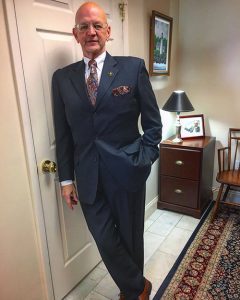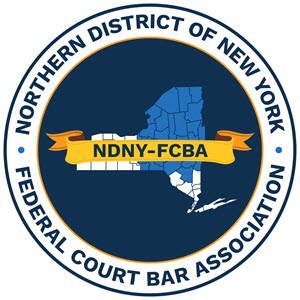 Rob Wells is a criminal defense attorney based in Syracuse, with a reputation for humane, individualized and zealous advocacy, in both federal and state court, and also in college disciplinary proceedings. He also serves as a Pro Se Coordinator for the Pro Se Assistance Program, each year helping dozens of self-represented litigants better understand the federal civil action process. Rob is also a past president of the New York State Association of Criminal Defense Lawyers.
Rob Wells is a criminal defense attorney based in Syracuse, with a reputation for humane, individualized and zealous advocacy, in both federal and state court, and also in college disciplinary proceedings. He also serves as a Pro Se Coordinator for the Pro Se Assistance Program, each year helping dozens of self-represented litigants better understand the federal civil action process. Rob is also a past president of the New York State Association of Criminal Defense Lawyers.
Describe the Pro Se Assistance Program
I am most proud of the FCBA, our Court and the Clerk’s Office for our Pro Se Program, because it has a real impact on real people.
Put yourself in the litigants’ shoes, when they’re looking up at the front door to the federal building, whether it’s in Syracuse or Albany, and looking up at what must seem to them to be a fortress – more designed to repel people – and realize you’re there on your own. You have probably tried to get a lawyer, and maybe people didn’t believe in you, or didn’t believe your case was worth anything, but you’re still willing to do this and go there on your own. No law degree, no experience, but you feel so strongly about your case that you have no choice but to go to federal court.
For me to be able to talk to them, when they’re in that position, to be able to show them that the door opens, and be able to talk to them about their case, it’s gratifying. It’s a journey they’re on, and it’s a frightening journey, but it’s often one they’re dedicated to.
How do you advise pro se litigants?
They find their way to us, and I’m not always sure how. Some of them are referred to us by the judges themselves when they have started an action on their own.
First, we try to make sure they’re in the right place. I’ve had folks call who have filed suits in other states and other federal districts. You first talk to folks about where they are, who they are, and what they’re trying to do.
Every lawsuit is a story, and you’re trying to get the jury to care about what you care about. So we listen first to their story. Some of the stories are incredible. But you must listen.
Then, you make sure people understand you’re not their lawyer, and you cannot advise them on matters of substantive law or even something like statutes of limitations. We care about what they’re doing, we’ll help them get in the door, show them where to go and what forms to use, but we’re not their lawyers or advisers.
The next part is showing them how to research. I like the online library from Cornell Law School. I also urge people to talk to a law librarian and see what they have available. I want people to educate themselves about substantive law and we make sure they know about our Local Rules in addition to the Federal Rules.
Then, what I want them to do is ignore the forms. I want people to think about their story, to write it one fact per sentence. It’s not different from writing who, what, when, where and why. Then I have them send me their story. Then I will review the story with them. We forget about courtrooms, we just talk about the story.
An example of a powerful case story: A young African American guy, working at a thrift store, had been fired for combining his breaks in order to take his daughter to the doctor. A white lady did the same thing and got only a warning. Then he said to me, “Mr. Wells, ever since the first day I worked there, she called me, ‘Boy.’ And do you know what word I heard when she called me ‘Boy’?” And I knew he was going to file that lawsuit, and mention that he had been called “Boy.” And so we get caught up in story, because that’s everything. We then fit the story into a complaint.
I help them get through the other paperwork. We make our way down through the list of necessary forms and papers.
And I can’t tell you how many of these people just want to be heard. They want someone to listen to them. And it feels like on many levels, at many junctures, nobody’s listened to them. I’m not focused on whether they have a good claim or not. I’m just trying to help them get their cases filed.
We also get some nutty people, who want to sue the United Nations, or the President, or they don’t like what happened in Family Court and they want to sue the judge. But it’s important to hear them out too. Sometimes you keep them out of trouble. And then you get people who are not fluent in English. And I try to get them assigned an attorney early in the case, but there are not enough resources to do that.
What cases are you most proud of, from your private, criminal defense practice?
Some of the cases I’m most proud of are the ones that are never brought, that you never hear about. That can be very gratifying, to keep the federal government off of someone they should not be jumping on to begin with, or entering into a prosecution diversion agreement. Because even if you get a trial acquittal, the person may still be ruined. They may spend everything they got defending themselves. Or the publicity ruins them. I love getting in early, helping prosecutors make up their mind rather than trying to get them to un-make up their mind.
I had a six-week environmental criminal jury trial before Judge Hurd, seven defendants, and was the only one with a jury acquittal – that’s one of the ones I’m most proud of. My client and I walked from the courtroom together.
I have also been proud to represent people in federal law enforcement who have had issues in their personal lives. It’s gratifying to help someone when they recognize and come to you as a client because the way you worked with them over the years, even though you’ve fought like cats and dogs.
What case keeps you up at night?
Every trial I’ve ever had – I sit down from a summation and say oh my gosh I forgot to say something. And if you ever hear the clinking of the handcuffs to the waist chains of a client, you wonder what else could I have done? It’s just human nature, to lawyers who care, that you’ve never done good enough. I’ve even felt that way when I’ve gotten acquittals.
There are cases where someone is punished too severely because there was not enough individualization in the sentencing process. I recently represented a woman with a low IQ, who had been coerced and manipulated into doing bad things, and had been abused herself. I couldn’t get anybody to really sufficiently listen. And I know my work was good.
I know the judges understand and believe my writing, but sometimes the mathematical calculations and proportions seem to be more important than still diving deeper into the individualized justice that’s needed.
Sometimes you don’t get to the place where the case, or your client, needed to be. Some lawyers are resilient, it doesn’t get to them, they bounce back. It takes me a little longer to bounce back because I can’t just disconnect from those clients in the way I probably should.
Describe your work in college disciplinary proceedings.
Each college is its own fiefdom. Each college runs the proceedings differently. Each has its own rules, and adapting to them is enough of a challenge. It’s not like, well, I’ve handled one in SUNY Oswego, so I’m all set for Cornell. It’s a very esoteric kind of thing to be able to navigate.
I don’t know why folks have found their way to my door, but they have. The colleges seem to want to do the right thing, but as soon as a student is charged with something, they turn their back on the student. The university is supposed to act in the role of a parent, and the last thing a parent does is throw the kid out as opposed to keep them in the family. It’s a hard place for a kid to navigate. And our role is to assist. I don’t even get a voice in a hearing. I’m reminded that I’m there as a guest.
And if someone is separately charged in a criminal court, you want to get the university to slow down, so that we are not forced to forsake our constitutional rights and privileges just to respond to the university. I’ve got one right now where the university proceeding was recorded, and the recording is in the discovery packet in the criminal case.
It’s just this hodgepodge and crazy quilt of how these proceedings are done. These cases have come out well, so far, but these are cases I worry about, because the students’ futures are in the balance.
What advice do you give to law students or young attorneys?
Listen. Don’t try to be what someone else thinks you should be, whether it’s a TV or movie lawyer, or some famous lawyer. Just be real. Tell the true story, love what you do, believe in your clients. I haven’t yet found a client I have not had something in common with, underneath it all, and that includes murder and death penalty cases. Just see the humanity in the profession, in the situation, in the clients, in the conflicts, and work from there.

